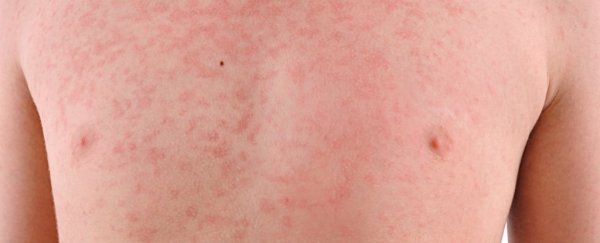Australia has one of the highest measles vaccination rates in the world, and yet here especially, a second dose is essential for lifelong immunity. In the state of Victoria, recent research into measles cases has shown that a small number of people who've been vaccinated with just one jab can still catch and spread the super-contagious virus.
Before measles was eradicated in Australia, an individual with just a single vaccination had a pretty good chance of coming into contact with another person who had measles. Similar to a second shot, this then gave them a natural boost in their antibody levels.
But what happens when immunity is left to wane? Australia was declared measles-free just five years ago, and since then, a new study has identified a possible emerging problem.
In Victoria, between 2014 and 2017, researchers have found that seven percent of all measles cases were caused by secondary vaccine failure - meaning individuals had at least one dose of the vaccine and showed antibodies, but the protection had waned to the point of contraction. In the preceding six years, no such examples were found.
These weren't exactly your classic measles cases, either. Of the 13 secondary vaccine failures identified in this time period, each presented with a rash, though the individuals were far less likely to have a fever, runny nose or cough. In one tragic instance, the infection was even passed on to two infants who were too young for vaccination.
"Overall, in countries that have eliminated measles transmission, this is likely to emerge as a problem," explains lead author Katherine Gibney, an epidemiologist at the Doherty Institute and the Victorian Department of Health and Human Services.
"There isn't going to be an enormous number of cases, but it will be important in terms of recognising measles, because the cases are a bit different to those who aren't immune."
The measles vaccine has been in use for the past 50 years, and it is easily the best and safest way to ensure immunity against this dangerous virus. In Australia, the efficacy of one dose is estimated at roughly 96.7 percent, while for two, it's more like 99.7 percent.
Today, most Australian children receive two doses, but before the 1990s, this wasn't routine practice. As such, there are many Australians aged between 20 to just over 50 who only have one dose, or maybe, given Australia's lower vaccination rate in the 80s, none at all.
These individuals pose a unique threat to public health, even without interference from overseas. The authors found that 54 percent of these waning immunity cases were actually acquired in Australia, while only 23 percent were brought back from the Philippines.
"In most cases, people are unaware they need the second vaccine, or they simply don't remember if they have had one or two," says Gibney.
"Anyone who is unsure if they have had two doses of measles vaccine should see their doctor about getting an additional dose. In particular, adults born after 1965 might not have received two doses of measles vaccine during their routine childhood immunisation."
Very few people who get both doses will get the measles if exposed, but it can still happen, as one case in this study exemplified.
"Our findings challenge the assumption of immunity among those who are fully vaccinated against measles and those with measles-specific [antibodies]," the authors write.
"The proportion of contacts who are fully vaccinated and/or [antibody-positive] and go on to develop measles is presumably low, but not zero."
Far from being an argument against vaccination, it merely shows how important these health practices truly are. According to the US Centres for Disease Control and Infection, situations like the one mentioned above happen very rarely; even when they do, individuals will suffer less and be less contagious to others if they have received both doses.
The new study is obviously small in its scope, having only identified a total of 190 measles cases. It also must be acknowledged that for four of the cases considered secondary vaccine failure, documentation of the actual dosages was not available and thus the researchers had to rely solely on individual statements.
Nevertheless, as our disease eradication rates have grown, the idea of waning immunity, however small it might be, is an emerging phenomenon worthy of more research.
"Normally, if people have documented receiving two doses of measles vaccine we would be confident they won't contract measles, but that's getting greyer – this research has demonstrated some vaccinated people are getting measles," says Gibney.
The research was published in Clinical Infectious Diseases.
